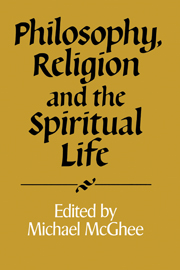Book contents
- Frontmatter
- Contents
- Introduction
- Philosophy and Religion in the Thought of Kierkegaard
- De Consolatione Philosophiae
- The real or the Real? Chardin or Rothko?
- Love and Attention
- Descartes' Debt to Augustine
- Visions of the Self in Late Medieval Christianity: Some Cross-Disciplinary Reflections
- Refined and Crass Supernaturalism
- Religious Imagination
- Moral Values as Religious Absolutes
- Revealing the Scapegoat Mechanism: Christianity after Girard
- Philosophy vs. Mysticism: an Islamic Controversy
- Non-Conceptuality, Critical Reasoning and Religious Experience: Some Tibetan Buddhist Discussions
- ‘Know Thyself’: What Kind of an Injunction?
- Facing Truths: Ethics and the Spiritual Life
- Notes on Contributors
- Index
‘Know Thyself’: What Kind of an Injunction?
Published online by Cambridge University Press: 04 August 2010
- Frontmatter
- Contents
- Introduction
- Philosophy and Religion in the Thought of Kierkegaard
- De Consolatione Philosophiae
- The real or the Real? Chardin or Rothko?
- Love and Attention
- Descartes' Debt to Augustine
- Visions of the Self in Late Medieval Christianity: Some Cross-Disciplinary Reflections
- Refined and Crass Supernaturalism
- Religious Imagination
- Moral Values as Religious Absolutes
- Revealing the Scapegoat Mechanism: Christianity after Girard
- Philosophy vs. Mysticism: an Islamic Controversy
- Non-Conceptuality, Critical Reasoning and Religious Experience: Some Tibetan Buddhist Discussions
- ‘Know Thyself’: What Kind of an Injunction?
- Facing Truths: Ethics and the Spiritual Life
- Notes on Contributors
- Index
Summary
To be told, ‘know thyself’ is to be told that I don't know myself yet: it carries the assumption that I am in some sense distracted from what or who I actually am, that I am in error or at least ignorance about myself. It thus further suggests that my habitual stresses, confusions and frustrations are substantially the result of failure or inability to see what is most profoundly true of me: the complex character of my injuries or traumas, the distinctive potential given me by my history and temperament. I conceal my true feelings from my knowing self; I am content to accept the ways in which other people define me, and so fail to ‘take my own authority’ and decide for myself who or what I shall be. The therapy-orientated culture of the North Atlantic world in the past couple of decades has increasingly taken this picture as foundational, looking to ‘self-discovery’ or ‘self-realization’ as the precondition of moral and mental welfare. And the sense of individual alienation from a true and authoritative selfhood mirrors the political struggle for the right of hitherto disadvantaged groups, especially non-white and non-male, to establish their own self-definition. The rhetoric of discovering a true but buried identity spreads over both private and political spheres. The slogan of the earliest generation of articulate feminists, ‘The personal is the political’, expresses the recognition of how this connection might be made.
- Type
- Chapter
- Information
- Philosophy, Religion and the Spiritual Life , pp. 211 - 228Publisher: Cambridge University PressPrint publication year: 1992
- 2
- Cited by



